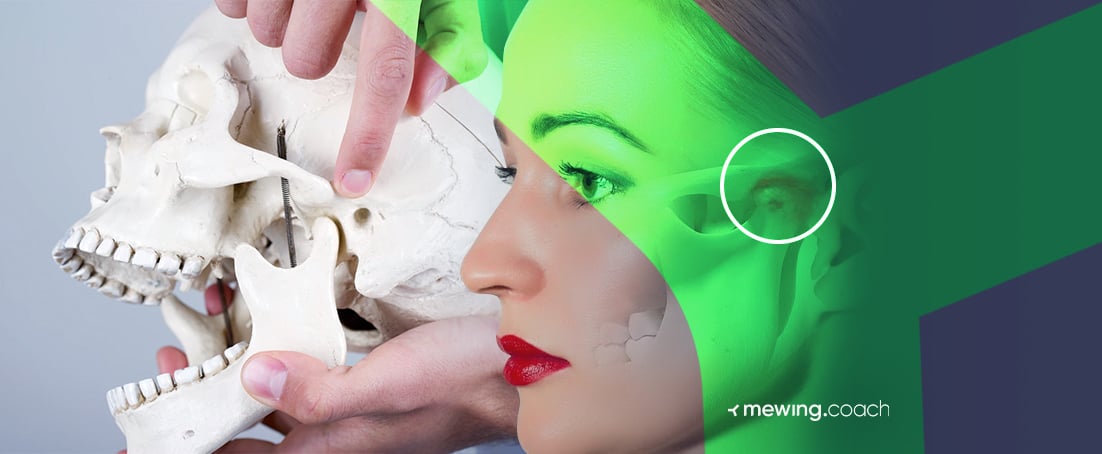
Have you ever felt a painful sensation in your jaw or like you could not stop your jaw from clicking? You got scared and thought you had a broken or dislocated jaw? If you had all those questions going around in your head, don’t worry; there is a way to treat jaw popping.
The clicking sound may be from overextending the jaw during eating or yawning and could be treated easily. However, if it is accompanied by pain, then usually temporomandibular joint disorder TMJ is the cause of jaw popping. This repetitive chronic pain can harm your daily lifestyle, socializing, and self-confidence. To find out about this condition, its symptoms, and treatment options, continue to read.
What can you learn from this article:
- What is jaw popping
- What are the causes and symptoms
- What type of treatment options do you need to prevent the TMJ disorder
Phenomenon of Jaw Popping
Jaw popping pertains to the audible sound produced when the jaw joint is in motion. It can present as a clicking, popping, or snapping noise while engaging in activities like chewing, speaking, or yawning. Jaw popping may be coupled with feelings of discomfort or pain and could signal underlying concerns with the temporomandibular joint (TMJ) or adjacent structures.
Forms of Jaw Popping
- Single Pop: Occurs when the jaw emits a single popping sound during movement.
- Multiple Pops: Involves repeated popping sounds as the jaw moves.
- Continuous Popping: Characterized by a constant or ongoing popping sensation during jaw movement.
- Loud Popping: Refers to popping sounds that are notably loud or pronounced.
- Subtle Popping: Describes popping sounds that are softer or less noticeable.
- Painful Popping: Involves popping sensations accompanied by discomfort or pain in the jaw joint.
- Pain-Free Popping: Refers to popping sounds without any associated discomfort or pain.
- Intermittent Popping: Occurs sporadically or irregularly, with periods of popping interspersed with quiet movement.
- Persistent Popping: Refers to popping sensations that consistently occur during jaw movement over an extended period.
Anatomy and Causes of Jaw Popping
To know how to stop jaw from clicking, we first need to understand its anatomy and the causes that make your jaw click. Medically speaking, the human jaw consists of the maxilla and mandible (upper and lower jaw), two primary nerves, temporomandibular joints, and teeth. Also, the jaw connects and supports connective tissues like muscles, lips, and tongue.
All of these components must work properly for a healthy jaw function. Therefore, if you start noticing jaw clicks or jaw-popping sound, the root cause is dysfunction due to joint inflammation. It may be simple muscle tension, or it may be more severe jaw injuries.
- Temporomandibular Joint (TMJ) Dysfunction: Issues with the jaw joint can lead to clicking sounds during mouth movements, such as with temporomandibular disorder (TMD) or temporomandibular joint disorder (TMJD).
- Cartilage Damage: Injury to the jaw joint’s cartilage can cause clicking or popping noises.
- Teeth Misalignment: Poor alignment of the teeth can affect jaw movement, potentially causing clicking sounds.
- Bruxism: Teeth grinding or clenching, especially during sleep, can stress the jaw muscles and contribute to clicking. Arthritis: Conditions like rheumatoid arthritis or osteoarthritis can affect the temporomandibular joint, leading to clicking or popping sensations.
- Trauma or Injury: Previous injuries to the jaw or face may result in clicking sounds due to damage or misalignment of the joint.
- Stress: Emotional or psychological stress can create tension in the jaw muscles, leading to clicking or popping sensations.
- Muscle Imbalance: Discrepancies in the muscles controlling jaw movement can cause clicking sounds during jaw motion.
- Jaw Overuse: Excessive chewing gum, nail biting, or other habits that strain the jaw joint can contribute to jaw clicking.
- Structural Issues: Structural irregularities in the jaw or skull, such as a misaligned bite or uneven jaw growth, can trigger clicking sounds during jaw movement.
- Malocclusion: Poor alignment of the teeth or jaws, known as malocclusion, can disrupt the smooth movement of the jaw joint and result in clicking noises.
- Joint Disk Displacement: Shifting of the disk within the temporomandibular joint can cause clicking or popping sensations, especially when opening or closing the mouth.
- Myofascial Pain Syndrome: Chronic pain disorder that involves muscle pain and inflammation, commonly affecting the jaw muscles and leading to clicking or popping sensations.
- Sleep Apnea: Breathing disorder during sleep that can cause changes in jaw position and muscle tension, contributing to clicking or popping noises in the jaw.
Telltale Symptoms of Jaw Clicking and Popping
Since each person is different, you may or may not have some or all symptoms. The following indicators generally accompany temporomandibular disorder:
- Jaw pain
- Soreness or stiffness in the jaw
- Struggling to open your mouth
- Feeling pain while chewing
- Popping and clicking noises
- Jaw lock when you open your mouth and when it is closed
- Misalignment of the jaw (feeling like not in a natural position)
- Improper biting
- Tinnitus
- Toothaches
- Ear pain
- Face swelling
- Possible neck pain or shoulder pain
- Other symptoms
Pinpointing the Problem: How to Get a Proper Diagnosis for Your Jaw Issues
If you are experiencing any symptoms that point to temporomandibular disorders and are accompanied by pain, you must seek medical treatment options. You will need to consult with a doctor or dentist and have a proper examination to diagnose your jaw issues accurately.
The medical professional will tell you to make mouth movements to hear and observe the sounds. He will also need to press the area where you feel discomfort to check for swelling. If the doctor believes that there is a more significant issue that a regular check-up can not notice, he will recommend you do a dental X-ray, CT scan, or MRI for a precise diagnosis.
Treatment of Clicking Jaw
Treatment for a clicking jaw may include divergent approaches, such as exercises to help you reduce the jaw pain, lifestyle changes, massage therapy, relaxation techniques like improving the mobility of the jaw, etc. Medication such as muscle relaxants or anti-inflammatories is also a common way of treatment. Your doctor can recommend some therapy, like oral splints.
Similarly, you may try home remedies if you experience jaw popping for cases that are not severe and do not include therapeutic treatment. Although, in some cases, surgical treatments are necessary, and your doctor may suggest them as a permanent way to relieve pain.
Conservative Management Options
After an underlying medical condition is set, your doctor or dentist may suggest conservative management solutions. Those are plain, straightforward, and also cost-effective. Some of those can include:
- Reducing stress as one of the trigger points for the jaw to pop
- Eating softer foods (you can eat soft foods like cooked vegetables)
- Medical personnel can show you to relax, massage, and stretch the muscles near your jaw or give you a guide on loosening jaw tightness.
- Reduce certain activities like chewing gum or yawning
- Putting ice packs or heat packs on your face
- To exercise for a better blood flow
- Utilizing prescribed pain and anti-inflammatory medications
- Prescribed muscle relaxers
- Try a mouthguard appliance or a similar one
Simple Lifestyle Changes and Exercises to Relieve Jaw Pressure
To fix clicking jaw, the American Academy of Family Physicians suggested simple exercises that can enhance jaw motions. Here are some of the ways how to fix jaw popping:
- Jaw relaxed training
- Semi opening exertion
- Complete opening movement
- Tucking the chin exercise
- Hold out against exercise
- Counter closing the mouth exertion
- Open and close the mouth with your tongue exercise
- Abreast jaw motions
- Forward jaw motions
Besides utilizing jaw exercises, you can try stress-relief methods to help prevent actions that cause jaw tension. Also, acupuncture is a solid option for relieving stress and discomfort. Another great option is practicing correct tongue positioning.
Night Guards and Bite Splints
One way not to grind your teeth is night guards or dental splints, which protect your teeth while you sleep. The bite splints will help your jaw muscles to relax and rest, alter the joint position of the jaw and prevent teeth grinding.
Physical Therapy and Trigger Point Injections
A certified physical therapist can help you regain jaw movements and make them painless again. Certain techniques like radio wave therapy and low-level laser can increase blood flow. But if you have mild pain in your face, neck, back, shoulder, and other parts, your doctor may prescribe trigger point injections for faster removal of pain.
Surgery
Medical procedures like surgeries are left as a last resort if other treatments won’t help. This type of medical attention offers several surgical options:
- Arthrocentesis
- TMJ arthroscopy
- Adjusted condylotomy
- Open-joint surgery
Consequences of Untreated Jaw Clicking
Neglected jaw clicking can result in a range of outcomes impacting both oral health and overall well-being. From heightened discomfort to potential joint damage, disregarding jaw clicking can worsen underlying conditions such as temporomandibular joint disorder (TMD). Below are the possible consequences of leaving jaw clicking untreated:
- Increased discomfort and pain in the jaw joint.
- Progression of underlying conditions like temporomandibular joint disorder (TMD).
- Worsening of symptoms such as headaches and difficulty with chewing.
- Potential damage to the jaw joint and surrounding structures.
- Reduced quality of life due to persistent discomfort and limited jaw function.
Mewing: Can This Trendy Oral Posture Technique Help Your Jaw Issue?
Before we get into a comprehensive mewing technique explanation, we offer you to get the Mewing. coach app, so you do not spend time scrolling and searching on the net for exercises. You can find jaw exercises to stop clicking, and the software can help you find all useful mewing tricks. The free software is entirely adjustable and can be tailored to your specific needs. Download it for iOS and Android and start your mewing experience!
Since mewing helps you effectively sculpt your jaw use it for relaxation exercises and define your jawline. The technique is to consciously and consistently position your tongue against the roof of the mouth. Correct tongue positioning is vital for oral health, as it can assist in improving the alignment of the teeth, jaw, and facial structure.
The Bottom Line
If you have jaw problems and pain, the best way to address them is to seek medical assistance. Therefore, you will have a clear picture of your diagnosis, so you can continue searching for the best treatment options. On that note, there are many solutions to fix jaw clicking and popping, which you can choose. Medical personnel consultations will resolve your doubts about which therapy will suit you best. However, in the meantime, you can try some natural pain relievers and actions that can decrease stress in the jaw, such as exercises, cooked soft food, ice packs, mewing, etc.



